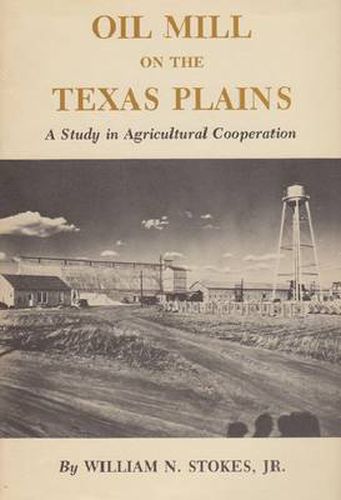Readings Newsletter
Become a Readings Member to make your shopping experience even easier.
Sign in or sign up for free!
You’re not far away from qualifying for FREE standard shipping within Australia
You’ve qualified for FREE standard shipping within Australia
The cart is loading…






This title is printed to order. This book may have been self-published. If so, we cannot guarantee the quality of the content. In the main most books will have gone through the editing process however some may not. We therefore suggest that you be aware of this before ordering this book. If in doubt check either the author or publisher’s details as we are unable to accept any returns unless they are faulty. Please contact us if you have any questions.
The Plains Cooperative Oil Mill in Lubbock was organized in 1937 to process and market cottonseed oil on a cooperative basis. With annual sales in 1999 averaging 150 million dollars, the Plains mill is now a trendsetter in the cottonseed industry, processing on average 600,000 tons of cottonseed a year-approximately 15 percent of the cottonseed processed in the United States. Since its inception the Plains mill has returned millions of dollars to its patrons, removed the Dallas differential, which in the early days penalized Plains producers at the marketplace, and actively encouraged the development of other cooperative activities in the area. Its influence, direct and indirect, on Plains agriculture has been incalculable. Despite the farsighted assistance of the Houston Bank for Cooperatives, the Plains mill, faced with inadequate capital, losses in membership, and obsolete facilities, got off to an uncertain start. But in 1943 new manager Roy Davis saw that extensive irrigation would soon revolutionize cotton production, and under his imaginative and innovative guidance the Plains mill became the largest and one of the most successful cottonseed oil mills in the world. A recent venture into milling sunflower seed brought near disaster when the market dropped far below the mill’s guaranteed payment, but courageous support by the gins and the Houston Bank for Cooperatives brought the Plains mill back to successful operation. This lively insider’s look at the Plains mill, written by a former president of the Houston bank, dramatically demonstrates the importance of adequate capital, sound management principles, membership support, and a sympathetic lending institution in the development of a cooperative enterprise.
$9.00 standard shipping within Australia
FREE standard shipping within Australia for orders over $100.00
Express & International shipping calculated at checkout
This title is printed to order. This book may have been self-published. If so, we cannot guarantee the quality of the content. In the main most books will have gone through the editing process however some may not. We therefore suggest that you be aware of this before ordering this book. If in doubt check either the author or publisher’s details as we are unable to accept any returns unless they are faulty. Please contact us if you have any questions.
The Plains Cooperative Oil Mill in Lubbock was organized in 1937 to process and market cottonseed oil on a cooperative basis. With annual sales in 1999 averaging 150 million dollars, the Plains mill is now a trendsetter in the cottonseed industry, processing on average 600,000 tons of cottonseed a year-approximately 15 percent of the cottonseed processed in the United States. Since its inception the Plains mill has returned millions of dollars to its patrons, removed the Dallas differential, which in the early days penalized Plains producers at the marketplace, and actively encouraged the development of other cooperative activities in the area. Its influence, direct and indirect, on Plains agriculture has been incalculable. Despite the farsighted assistance of the Houston Bank for Cooperatives, the Plains mill, faced with inadequate capital, losses in membership, and obsolete facilities, got off to an uncertain start. But in 1943 new manager Roy Davis saw that extensive irrigation would soon revolutionize cotton production, and under his imaginative and innovative guidance the Plains mill became the largest and one of the most successful cottonseed oil mills in the world. A recent venture into milling sunflower seed brought near disaster when the market dropped far below the mill’s guaranteed payment, but courageous support by the gins and the Houston Bank for Cooperatives brought the Plains mill back to successful operation. This lively insider’s look at the Plains mill, written by a former president of the Houston bank, dramatically demonstrates the importance of adequate capital, sound management principles, membership support, and a sympathetic lending institution in the development of a cooperative enterprise.